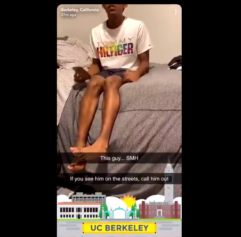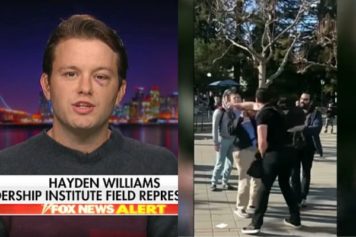A viral video showing a U.C. Berkeley cop ticketing a hot dog vendor, then emptying his wallet has sparked outrage.
Berkeley alum Martin Flores, the man who uploaded the video to Facebook, was leaving a football game with his family Sept. 9, when he witnessed a U.C. Berkeley officer citing a man for selling food without a permit, according to his GoFundMe page. The campus cop, later identified as Sean Aranas, then takes the vendor’s wallet and proceeds to pocket his money.
“That’s not right,” Flores is heard saying, defending the vendor only identified as Juan. “You’re going to take his hard-earned money?”
“People can drink on campus and at football games and no ticket, but a hardworking man selling hot dogs, earning a living, gets his money taken away and a ticket?” Flores adds.
Another bystander in the background can be heard shouting, “He must’ve voted for Trump,” seemingly referring to Aranas.
The officer soon responds to Flores’ concerns, saying, “We’ll take it to the judge and the judge can decide whether or not it’s right. He doesn’t have a permit.”
“Yep, this is law and order in action,” Aranas continued.
The incident has since prompted Flores to launch a GoFundMe campaign on behalf of Juan. So far, the page has collected over $53,000 in donations in just two days. The goal was to reach at least $10,000.
“I just want to be clear that NO funds will go to me,” Flores wrote on the campaign page. We will ensure that Juan has his personal, legal and professional matters addressed. Juan is a symbol of the injustice that takes place to street vendors. Therefore, a collective effort to support street vendors will also benefit.”
U.C. Berkeley Police are said to be investigating the incident, Vice Chancellor Scott Biddy told The Washington Post. As for Juan’s money, it was booked into evidence.
“I assure you that the well-being of our community members, including those from our marginalized communities of color, is most important to us,” Biddy said in a statement Monday, Sept. 11.
“We are deeply committed to building a climate of tolerance, inclusion and diversity, even as we enforce laws and policy.”


